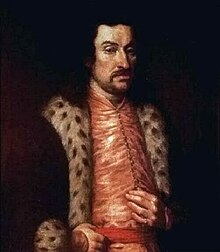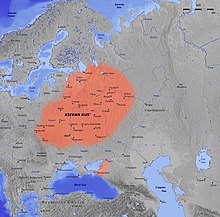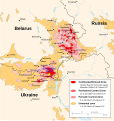Portal:Ukraine
The Ukraine Portal - Портал України
Ukraine Україна (Ukrainian) | |
|---|---|
| ISO 3166 code | UA |
Ukraine is a country in Eastern Europe. It is the second-largest European country after Russia, which borders it to the east and northeast. Ukraine also borders Belarus to the north; Poland and Slovakia to the west; Hungary, Romania and Moldova to the southwest; and the Black Sea and the Sea of Azov to the south and southeast. Kyiv is the nation's capital and largest city, followed by Kharkiv, Dnipro, and Odesa. Ukraine's official language is Ukrainian.
Humans have inhabited Ukraine since 32,000 BC. During the Middle Ages, it was the site of early Slavic expansion and later became a key centre of East Slavic culture under the state of Kievan Rus', which emerged in the 9th century. Kievan Rus' became the largest and most powerful realm in Europe in the 10th and 11th centuries, but gradually disintegrated into rival regional powers before being destroyed by the Mongols in the 13th century. The area was then contested, divided, and ruled by a variety of external powers for the next 600 years, including the Polish–Lithuanian Commonwealth, the Austrian Empire, the Ottoman Empire, and the Tsardom of Russia.
The Cossack Hetmanate emerged in central Ukraine in the 17th century but was partitioned between Russia and Poland before being absorbed by the Russian Empire in the late 19th century. Ukrainian nationalism developed and, following the Russian Revolution in 1917, the short-lived Ukrainian People's Republic was formed. The Bolsheviks consolidated control over much of the former empire and established the Ukrainian Soviet Socialist Republic, which became a constituent republic of the Soviet Union in 1922. In the early 1930s, millions of Ukrainians died in the Holodomor, a human-made famine. During World War II, Ukraine wasoccupied by Germany and endured major battles and atrocities, resulting in 7 million civilians killed, including most Ukrainian Jews.
Ukraine gained independence in 1991 as the Soviet Union dissolved and declared itself neutral. A new constitution was adopted in 1996 as the country transitioned to a free market liberal democracy amid endemic corruption and a legacy of state control. The Orange Revolution of 2004–2005 ushered electoral and constitutional reforms. Resurgent political crises prompted a series of mass demonstrations in 2014 known as the Euromaidan, leading to a revolution, at the end of which Russia unilaterally occupied and annexed Ukraine's Crimean Peninsula, and pro-Russian unrest culminated in a war in Donbas with Russian-backed separatists and Russia. Russia launched a full-scale invasion of Ukraine in 2022. (Full article...)
In the news
- 16 January 2025 – Ukraine–United Kingdom relations
- British Prime Minister Keir Starmer visits Kyiv, Ukraine, to sign a 100-year agreement with Ukraine that will formalize British economic and military support for Ukraine. (Sky News) (BBC News)
- 15 January 2025 – Russian invasion of Ukraine
- Russian strikes against Ukrainian infrastructure
- Russia launches a major ballistic and cruise missile attack on regions across Ukraine, targeting energy production and compelling authorities to shut down the power grid. (AP)
- 14 January 2025 – Russian invasion of Ukraine
- Attacks in Russia during the Russian invasion of Ukraine
- Ukraine strikes targets in the Republic of Tatarstan and Bryansk, Saratov, and Tula oblasts, Russia, with more than 200 drones and five ATACMS ballistic missiles, hitting ammunition depots, industrial plants and a refinery, in what Ukraine says is its "most massive" and "deepest" attack inside Russia so far. (CNN) (BBC News)
- 13 January 2025 – Russian invasion of Ukraine
- Attacks in Russia during the Russian invasion of Ukraine
- Russia accuses Ukraine of targeting the Russkaya compressor station in the Krasnodar Krai, which feeds gas for the TurkStream pipeline, in a failed drone attack two days ago. (S&P Global)
- 11 January 2025 – Russian invasion of Ukraine
- Eastern Ukraine campaign
- The Russian Army says that it has gained control of the settlement of Shevchenko in Donetsk Oblast, Ukraine. (Anadolu Agency)
- Kursk offensive, North Korean involvement in the Russian invasion of Ukraine
Featured pictures
Did you know (auto-generated)

- ... that the Crimean Mountain karst nature reserve in Ukraine has more than 1,000 natural karst cavities?
- ... that Valeriy Chybineyev was honored as a Hero of Ukraine in 2016 for his actions during the war in Donbas?
- ... that the first film written and directed by Marysia Nikitiuk has been called one of the "most iconic" works of modern Ukrainian cinema?
- ... that German violinist and professor Aleksey Semenenko was stranded in Ukraine for a month because Russia invaded the country the day after his performance?
- ... that Major-General Andriy Kovalchuk, commander of the 2022 Ukrainian southern counteroffensive, met his wife, a fellow officer, when she chastised him for wearing an unpolished belt buckle?
- ... that Hanna Dmyterko was among 34 Ukrainian women who fought in World War I?
More did you know -
- ... that Ukrainian composer Mykola Leontovych (pictured), known for the "Carol of the Bells", was nicknamed "Ukrainian Bach" in France?
- ... that at its first years Kiev Zoo had to move its animals into the food storage of the main Kiev railway station for the winter?
- ... that among many historic landmarks at the Andrew's Descent in Kyiv, there is a medieval Gothic style castle that locals call the "Castle of Richard the Lion Heart" due to the legend the 12th century King of England had visited the building?
- ... that Vasyl Avramenko is often referred as "The father of the Ukrainian dance"?
- ... that according to legend, a tunnel leads from the Kamianets-Podilskyi Castle to the Khotyn Fortress which is 20 kilometres (12 mi) away?
- ... that the Khreschatyk is the main street of Ukrainian capital Kyiv on which Orange Revolution and other historical events mainly took place?
Selected article -
Odesa (also spelled Odessa) is the third most populous city and municipality in Ukraine and a major seaport and transport hub located in the south-west of the country, on the northwestern shore of the Black Sea. The city is also the administrative centre of the Odesa Raion and Odesa Oblast, as well as a multiethnic cultural centre. As of January 2021, Odesa's population was approximately 1,010,537.[1] On 25 January 2023, its historic city centre was declared a World Heritage Site and added to the List of World Heritage in Danger by the UNESCO World Heritage Committee in recognition of its multiculturality and 19th-century urban planning. The declaration was made in response to the bombing of Odesa during the Russian invasion of Ukraine, which has damaged or destroyed buildings across the city.
In classical antiquity a large Greek settlement existed at its location no later than the middle of the 6th century BC. It has been researched as a possible site of the ancient Greek settlement of Histria. The first chronicle mention of the Slavic settlement-port of Kotsiubijiv, which was part of the Grand Duchy of Lithuania, dates back to 1415, when a ship was sent from here to Constantinople by sea. After the Grand Duchy lost control, the port and its surroundings became part of the domain of the Ottoman Empire in 1529, under the name Hacibey, and remained in it until the Ottomans' defeat in the Russo-Turkish War (1787–1792). In 1794, a decree of the Russian empress Catherine II was issued to establish a navy harbor and trading place in Khadjibey, which was named Odessa soon after. From 1819 to 1858, Odesa was a free port. During the Soviet period, it was an important trading port and a naval base. During the 19th century, Odesa was the fourth largest city of the Russian Empire, after Moscow, Saint Petersburg and Warsaw. Its historical architecture is more Mediterranean than Russian, having been heavily influenced by French and Italian styles. Some buildings are built in a mixture of different styles, including Art Nouveau, Renaissance and Classicist. (Full article...)
In the news
- 16 January 2025 – Ukraine–United Kingdom relations
- British Prime Minister Keir Starmer visits Kyiv, Ukraine, to sign a 100-year agreement with Ukraine that will formalize British economic and military support for Ukraine. (Sky News) (BBC News)
- 15 January 2025 – Russian invasion of Ukraine
- Russian strikes against Ukrainian infrastructure
- Russia launches a major ballistic and cruise missile attack on regions across Ukraine, targeting energy production and compelling authorities to shut down the power grid. (AP)
- 14 January 2025 – Russian invasion of Ukraine
- Attacks in Russia during the Russian invasion of Ukraine
- Ukraine strikes targets in the Republic of Tatarstan and Bryansk, Saratov, and Tula oblasts, Russia, with more than 200 drones and five ATACMS ballistic missiles, hitting ammunition depots, industrial plants and a refinery, in what Ukraine says is its "most massive" and "deepest" attack inside Russia so far. (CNN) (BBC News)
- 13 January 2025 – Russian invasion of Ukraine
- Attacks in Russia during the Russian invasion of Ukraine
- Russia accuses Ukraine of targeting the Russkaya compressor station in the Krasnodar Krai, which feeds gas for the TurkStream pipeline, in a failed drone attack two days ago. (S&P Global)
- 11 January 2025 – Russian invasion of Ukraine
- Eastern Ukraine campaign
- The Russian Army says that it has gained control of the settlement of Shevchenko in Donetsk Oblast, Ukraine. (Anadolu Agency)
- Kursk offensive, North Korean involvement in the Russian invasion of Ukraine
Selected anniversaries for January

- January 3, 1681 — Treaty of Bakhchisarai was signed by Russia, the Ottoman Empire, and the Crimean Khanate at the conclusion of the Russo-Turkish War (1676–1681).
- January 10, 1992 — the Ukrainian karbovanets replaced the Soviet ruble at par, with the ISO 4217 code being
UAK. - January 15, 1967 — David Burliuk, an avant-garde artist, died in Long Island, New York.
- January 22, 1919 — The Act Zluky was signed, unifying the Ukrainian People's Republic and the West Ukrainian National Republic.
- January 23, 2005 — Ukrainian president Viktor Yushchenko was inaugurated into office after winning the second run-off elections in late 2004.
- January 29, 1918 — Battle of Kruty takes place between the Ukrainian People's Republic and Bolshevik forces.
Photo gallery
Related portals
Religions in Ukraine
Post Soviet states
Other countries
WikiProjects and collaborations
Associated Wikimedia
The following Wikimedia Foundation sister projects provide more on this subject:
-
Commons
Free media repository -
Wikibooks
Free textbooks and manuals -
Wikidata
Free knowledge base -
Wikinews
Free-content news -
Wikiquote
Collection of quotations -
Wikisource
Free-content library -
Wikiversity
Free learning tools -
Wikivoyage
Free travel guide -
Wiktionary
Dictionary and thesaurus
New articles
Ukrainian editions of Wikimedia projects
Notes
- ^ Чисельність наявного населення України на 1 січня 2022 [Number of Present Population of Ukraine, as of January 1, 2022] (PDF) (in Ukrainian and English). Kyiv: State Statistics Service of Ukraine. Archived (PDF) from the original on 4 July 2022.



![Image 1 Mykola Leontovych Mykola Dmytrovych Leontovych (Ukrainian: Микола Дмитрович Леонтович, pronounced [mɪˈkɔlɐ dmɪˈtrɔʋet͡ʃ ɫeɔnˈtɔʋet͡ʃ] ⓘ; 13 December [O.S. 1 December] 1877 – 23 January 1921) was a Ukrainian composer, conductor, ethnomusicologist, and teacher. His music was inspired by the Ukrainian composer Mykola Lysenko and the Ukrainian National Music School. Leontovych specialised in a cappella choral music, ranging from original compositions to church music to elaborate arrangements of folk music. Leontovych was born and raised in Monastyrok in the Podolia province of the Russian Empire (now in Vinnytsia Oblast, Western Ukraine). He was educated as a priest in the Kamianets-Podilskyi Theological Seminary. With the independence of the Ukrainian State in the 1917 revolution, he moved to Kyiv, where he worked at the Kyiv Conservatory and the Mykola Lysenko Institute of Music and Drama. He composed "Shchedryk" in 1914 (premiered in 1916), now known to the English-speaking world as "Carol of the Bells". He was murdered by a Soviet agent in 1921 and is known as a martyr in the Eastern Orthodox Ukrainian Church, where he is also remembered for his liturgy, the first composed in the vernacular, specifically in the modern Ukrainian language. (Full article...)](http://upload.wikimedia.org/wikipedia/en/d/d2/Blank.png)





























































